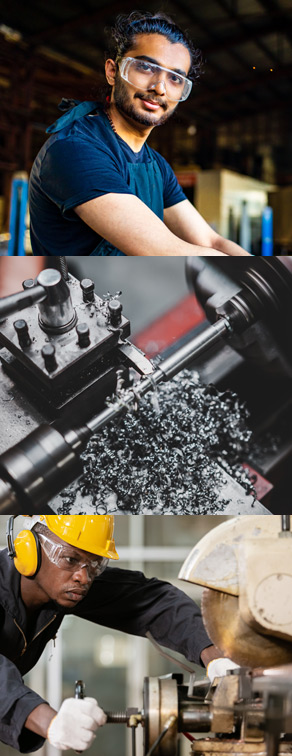About
At Rosemount Technology Centre, the Machining program has the objective to assist students in acquiring the competence to work in the well-paid parts manufacturing industry.
Students will learn to read, produce, and work from complicated and simple blueprint drawings while using precision measuring instruments and equipment.
Here are some of the things you will learn:
The students will also learn to work on parts manufacturing machines such as the Computer Numerical Control (C.N.C.) and manually operated milling machines, lathe machines, cylindrical grinders, horizontal grinders, and drill presses.
Here are some of the things you will learn:


The Machining Techniques program leading to a DVS is a 1800 hour course.
Day program (6 hrs/day): approximately 18 months.
Night program (5 hrs/day): approximately 22 months.
| Program Competencies | Hours | Credits | |
|---|---|---|---|
| 1 | The Trade and the Training Process This module introduces the student to the machining profession and allows a self-reflection on his/her suitability for the trade. Field trips to local manufacturing companies and classroom discussions help the student understand what is required of a machinist. |
15 | 1 |
| 2 | Occupational Health and Safety . |
30 | 2 |
| 3 | Manufacturing Processes and Materials |
45 | 3 |
| 4 | Machining Calculations |
60 | 4 |
| 5 | Interpreting Technical Drawings |
105 | 7 |
| 6 | Dimensional and Geometrical Control |
75 | 5 |
| 7 | Setting up Machine Tools |
45 | 3 |
| 8 | Machining-Related Tasks |
90 | 6 |
| 9 | Workplace Communication |
30 | 2 |
| 10 | Basic Lathe Operations |
90 | 6 |
| 11 | Basic Milling Machine Operations |
120 | 8 |
| 12 | Lathe Work |
105 | 7 |
| 13 | Milling |
120 | 8 |
| 14 | Operating a Numerical Control Lathe |
45 | 3 |
| 15 | Operating a Machining Centre |
45 | 3 |
| 16 | Manual Programming |
75 | 5 |
| 17 | Conversational Programming |
45 | 3 |
| 18 | Automatic Lathe Programming |
60 | 4 |
| 19 | Automatic Machining Centre Programming |
90 | 6 |
| 20 | Machining Using a Numerical Control Lathe |
105 | 7 |
| 21 | Machining Using a Machining Centre |
120 | 8 |
| 22 | Mass Production on a Numerical Control Lathe |
75 | 5 |
| 23 | Mass Production on a Machining Centre |
90 | 6 |
| 24 | Entering the Work Force This module represents the culmination and application of the Machining Techniques program. The student will complete a six-week stage in a manufacturing company. He/she will apply his/her knowledge while working to gain experience and understanding of working under “real world” conditions. |
120 | 8 |
| Total |
1800 | 120 |
Lathe Operator
Reamer Machine Set-Up Operator
Machine Shop Layout Worker
Precision Grinder
Drill Press Set-Up Operator
Set-Up Operator
Milling Machine Operator
Machine Shop Maintenance
To be eligible for admission to this program, candidates must meet one of the following requirements:
Persons holding a Secondary School Diploma or its recognized equivalent, for example, an Attestation of Equivalence of Secondary V studies, or a postsecondary diploma such as the Diploma of College Studies or a Bachelor's degree
OR
Persons who are at least 16 years of age on September 30 of the school year in which their training is to begin and have earned the Secondary IV credits in language of instruction, second language and mathematics in the programs of study established by the Minister, or have been granted recognition for equivalent learning
OR
Persons who are at least 18 years of age upon entry into the program and have the following functional prerequisites: the successful completion of the General Development Test (see the following table), or recognition of equivalent learning
OR
Persons who have obtained Secondary III credits in language of instruction, second language and mathematics in programs established by the Minister are required to pursue general education courses, concurrently with their vocational training, in order to obtain the Secondary IV credits they lack in language of instruction, second language and mathematics in programs established by the Minister.
This section identifies the modules or course codes for the actual programs of study in adult general education that are specific prerequisites in language of instruction and mathematics. Functional prerequisites includes the successful completion of specific prerequisites as well as the general development test (TDG). When a DVS doesn't require specific prerequisites in language of instruction or in mathematics, a dash ( - ) is displayed in the appropriate cell. For programs that lead to an AVS, specific prerequisites and the TDG do not apply (N/A).
| Language of instruction | |||
|---|---|---|---|
| Adults ENG-3103-3 ou (ENG-3071-3) |
|||
| Youth 632-406 ou (630-416) |
|||
Mathematics |
|||
| Adults MTH-3053-2 ou (MTH-3016-2) |
|||
| Youth 563-306 ou (568-314) |
Send an email to aevsinternational@emsb.qc.ca with the following information:
Begin the following steps to insure a complete student dossier
ROSEMOUNT TECHNOLOGY CENTRE
Copyright ©2005-2025 Rosemount Technology Centre. All Right Reserved.